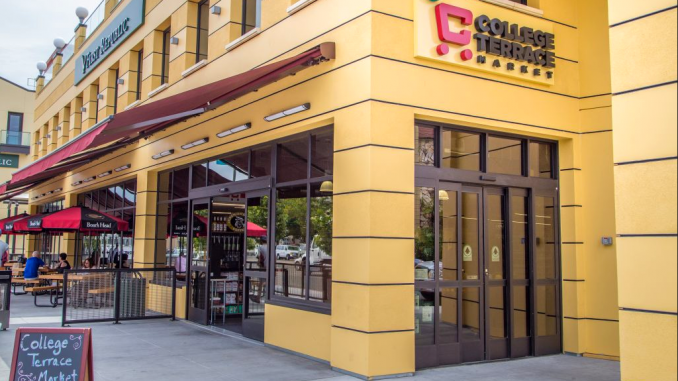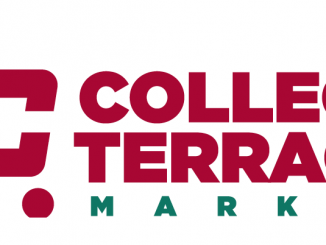
By the Daily Post staff
College Terrace Market, 2100 El Camino Real, is closing after six months in business, the third grocery store to shut down in Palo Alto in the past four years after just a few months of operation.
“It is with great sadness and regret that we are announcing that College Terrace Market will be closing its doors in the very near future,” General Manager Ron Jensen wrote on Facebook yesterday (Dec. 30). “We don’t have an exact date yet, but will make sure to let you know as soon as we have more information.”
In the meantime, he said, everything in the store is 50% off.
The store was required by Palo Alto City Council in 2010 as a “public benefit” when it approved the Planned Community-zoned redevelopment of the parcel that included the old JJ&F Market. In exchange for the 8,000-square-foot grocery store, the developer was allowed to build 38,980 square feet of office space.
The developer was James

Smailey, who was replaced by Brian Speiers, a co-owner of the property, according to a Dec. 15, 2014 report by City Manager Jim Keene.
College Terrace is the third Palo Alto grocery since 2013 to close after a just a few months of operation.
In 2013, Miki’s Farm Fresh Market, 3455 Alma St., shut its doors after six months in business. The store featured high-end gourmet feeds and ethnic specialties, but was only doing about $108,000 in sales after five months in business, and needed about $175,000 to stay open, landlord John McNellis said at the time. (Proprietor Michael “Miki” Werness was hired by the College Market operators when it opened in August 2017 but left the business on Aug. 22.)
McNellis replaced Miki’s with Grocery Outlet, offering high-quality food at low prices, and the store appears to be thriving.
In March 2015, the Fresh Market closed in the Edgewood Shopping Center near the Highway 101-Embarcadero Road interchange after less than two years in business. The Fresh Market chain said at the time that it was closing its stores in California to focus on business in the eastern U.S.
The closure prompted the city to fine the developer of the shopping center, Sand Hill Property Co., headed by Peter Pau, for every day the shopping center was without an operating grocery store. The fines totaled more than $1.3 million.
Like College Terrace, the city had required Sand Hill to provide a grocery store as a “public benefit” in exchange for the approval of an associated development, in this case the construction of 10 homes.
Sand Hill went to court over the fines. A judge on Dec. 15 negated $248,250 of the fines in a dispute over whether the council ordinance allowing the redevelopment required the developer to provide an “operating grocery store” or simply set aside space for a store. The judge only threw out part of the fines and both sides are expected in January to resume the battle over the remaining $750,000 in fines.
Meanwhile, a new grocery store opened at Edgewood on Dec. 1. It’s operated by Mustafa and Kyazi Mutlu, who own Crystal Springs Produce, 770 Polhemus Road in San Mateo.
While the court battle continues over whether the city required Sand Hill to provide an “operating grocery store” so simply space for a store, the 2010 ordinance allowing the College Terrace development contains more concrete language. On page 4 of Ordinance 5069, condition (b) (1) states: “A grocery store, with an area of 8,000 square feet, shall exist within the development for the useful life of the improvements.” Condition (b) (7) states: “The grocery store space shall remain in continuous operation as a grocery store.”
However, the city placed a couple of obstacles in the way of the market’s success. First, it allowed the main tenant of the building, First Republic Bank, to open a cafeteria for its employees. The cafeteria presumably took away potential customers from the market. Second, the city painted the curb red in front of the store, which might have discouraged El Camino motorists from stopping. The store offered parking, but it was underground, which isn’t as attractive to consumers looking to make a quick stop.



